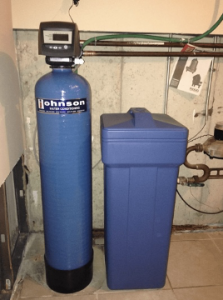What Does a Water Softener Do? A Warrenville Water Purification Company Explains
 Are you a homeowner who is new to the idea of water purification? If so, you’ve probably heard about a few of the different purification systems, but you might not be sure what they do.
Are you a homeowner who is new to the idea of water purification? If so, you’ve probably heard about a few of the different purification systems, but you might not be sure what they do.
Fortunately, this Warrenville water purification company has all the information you need. Below, we’re going to discuss not only the functionality of the water softener, but the benefits that it provides as well.
How Does a Water Softener Work?
Water softeners utilize a method known as ion exchange. In their case, specifically, sodium ions are exchanged for calcium and magnesium ions, thereby removing of all calcium and magnesium particles from the water. The result? The elimination of hard water.
One thing to note is that, in order for a water softener to carry out the ion exchange process, it must be filled with an entity known as softener salt. When activated, softener salt transfers sodium onto a piece of resin within the water softener. Then, as water passes through the water softener, the resin releases sodium ions while pick up calcium and magnesium ions. Therefore, if softener salt is not replenished on a regular basis, the water softener will not run properly.
The Benefits of a Water Softener
Water softeners offer a variety of benefits, some of which are functional in nature, and others of which are cosmetic in nature. We’ll discuss them all below.
Eliminates Limescale
Do you ever notice a white, powdery substance on your metal sinks or shower heads? Odds are, you’re looking at limescale. Limescale is essentially a small pile of calcium and magnesium particles. These particles come from hard water and remain on surfaces after the water has evaporated.
Limescale buildup causes no functional impairment. However, it can drag down the aesthetic of your bathroom and/or kitchen.
Fortunately, a water softener can work to remove calcium and magnesium from your water, thereby eliminating limescale build up in its entirety.
Reduces Wear and Tear on Pipes
Calcium and magnesium not only build up on metal sinks and shower faucets, but on the interior walls of water pipes as well. Unfortunately, when this happens, it causes far more than just cosmetic problems. In fact, it causes the pipe to narrow, thereby reducing overall water flow throughout the house. At its most severe, internal wall pipe buildup can actually cause water to stop flowing entirely.
The solution? All you have to do is install a water softener. A water softener will remove the calcium and magnesium from your water supply, effectively eliminating the risk of internal wall pipe buildup.
Facilitates Better Hair Health
You might be surprised to find that hard water has an effect on the human body as well. One part of the body that is often affected by hard water is the hair.
When the calcium and magnesium in hard water cling to the hair, they dry it out, causing it to become weak and brittle. Over time, this can result in broken hair and split ends. Fortunately, the fix is simple. It’s as simple as installing a water softener.
Facilitates Better Skin Health
In addition to its effects on hair, calcium and magnesium also have an effect on the skin. As calcium and magnesium particles cling to the skin, they clog up the skin pores. This stops the secretion of essential body oils, thereby drying out the skin and causing issues such as acne and eczema.
Want to take the strain off of your skin? A water softener can help solve the problem.
Install a Water Softener with a Warrenville Water Purification Company
Is a water softener right for your home? If so, and if you’re looking to buy one from a Warrenville water purification company, Johnson Water Conditioning has you covered.
Our water softeners offer only the best in performance and efficiency, and they are capable of accommodating water supplies of all sizes. We would be happy to install one in your home when you’re ready.
Contact us today to request a free quote!

 Better Water for
a Better Life
Better Water for
a Better Life
